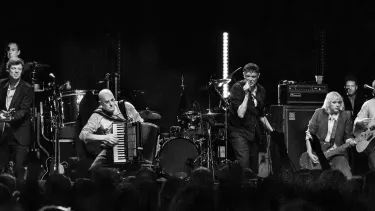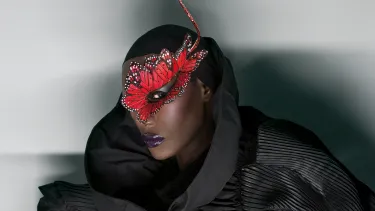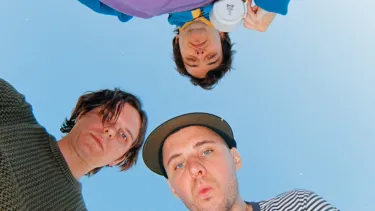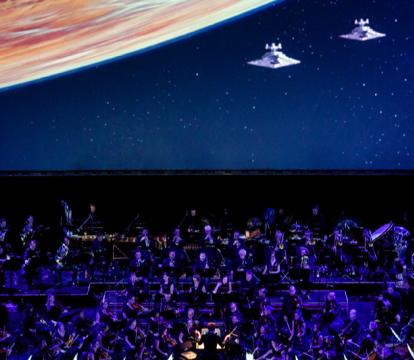Star Wars: From silver screen to symphony
We caught up with conductor Nicholas Buc who took us through the complex process of adapting films for live musical performances, and the endless inspiration of the Star Wars films.
It’s a moment that’s been giving sci-fi geeks goosebumps since 1977: the hold-your-breath silence as George Lucas’ teasing blue words (“In a galaxy...”) fade to black and we eagerly await the iconic logo to take flight with an explosion of brass fanfare. When the trumpets blare, so do theatres full of fans.
When Star Wars was finally given the ‘live score’ treatment in late 2017, and the New York Philharmonic blasted those opening notes up close and in person, the films were brought to life in ways that they never have been before. Performed in person, fans were reminded just how greatly indebted their fandom was to John Williams’ score.
One Melbourne-born maestro knows the live scoring game better than most. Nicholas Buc is a composer and conductor based in New York. But these days, when not working on his musical adaptation of David Copperfield, Buc hangs his hat wherever there’s a Symphony, a projector and a Concert Hall. He’s the go-to guy for live scores, and last year he led the Sydney Symphony Orchestra in performances of Return of the Jedi and The Force Awakens at the Sydney Opera House.
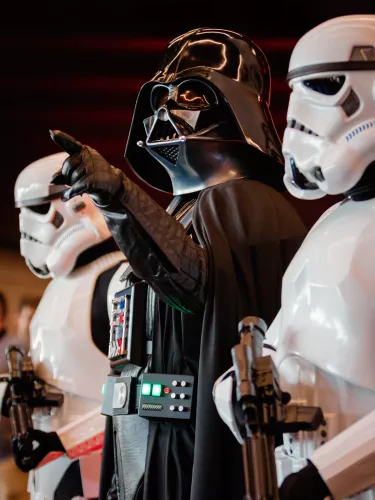
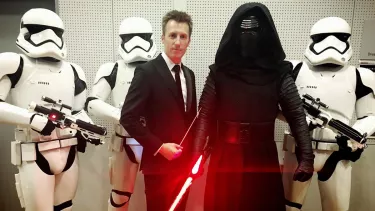
Sydney Opera House: Is there any one film or series that has been a particular career highlight to work on?
Nicholas Buc: If we’re talking purely musically it’s really hard to go past Star Wars. It’s been the benchmark for so many years. In 1977 that score was really quite groundbreaking. And it’s actually one of the more recent films to come out as a live score.
I did a six week tour recently with the Tokyo Philharmonic around Japan and we kicked off the tour by doing all three original Star Wars films in one day. It was incredible. We had the first film at 11am, then 3pm and 7pm and the audience bought marathon tickets, so the audience would be there for the whole day. It was a really special event.
SOH: Are there any film scores that you’ve been involved in that are more challenging for the orchestra?
NB: Yes. Without fail, the most complex score for the orchestra is the very first Harry PotterTM film. Especially for the strings—the violins. It’s fiendish. And I think when we did it with an orchestra last year we did the first and second films back to back and people were taking time off with tendinitis and arthritis in the fingers, because there are so many notes and it’s quite frighteningly difficult.
You get other films that are relatively straightforward, where there’s not a lot of music in them. A film like Jaws actually has very little music in it. Even classics like Back to the Future. Great score, but, you know, there’s only 42 minutes written for that two hour film. It seems like such a shame to have this wonderful orchestra sitting there for over an hour not playing anything. So they actually wrote more music for the live presentation, they've inserted extra bits that you'd never heard in the original release.
SOH: Is that common practice for live scores? Tell me about the process of arranging these things.
NB: Step one is actually convincing the studios to allow you to produce these concerts. And then it involves everything from getting a pristine cut of the film to separating the dialogue and the sound effects and music. Sometimes the films are quite old, and in the 60s and 70s digital archiving didn’t really exist, so they have to dig up handwritten scores and reconstruct them.
People often forget that these things are changed when they record the music. So John Williams may have written some music but then they get to the scoring stage and the director, whether it’s Spielberg or Lucas, might say: ‘look that’s great, but this little section here, I’m not happy with it, so can we rearrange this ... or take out the cellos ... or remove the French horns’. So the musicians will write little changes into their music on the fly. And often those things are the things that were never recorded and only by really carefully looking at the films in hindsight can we go back and actually make it into the film version that everyone knows.
Once that’s done, the show is packaged, they print out a gazillion copies of the music scores, an orchestra will get a laptop with a movie file — high res, 4K, pristine, beautiful version of the film with isolated dialogue and sound effects which someone has to mix live. And the orchestra plays the score. And it’s really the conductor’s job then to make sure it all syncs up.
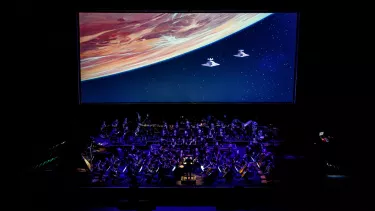
SOH: When orchestras record these scores in the first place, they often use a click track to help sync the music to the film, right? Is that something you or the performers use for the live scores?
NB: I probably do 80 percent of my shows without one. Primarily, because most classical orchestras and symphony orchestras around the world just don't like using them. For me, it takes away the organic nature of playing music.
The second reason is that, especially in the case of someone like John Williams, this music has a lot of freedom inherently sewn into it. And so, rather than using a click track, you'd use a little visual monitor in front of your conductor's podium which has all this visual information and cues to help you keep in time. I find that's a much more inherently musical way of performing, because it means you can ebb and flow and breathe and move with the orchestra in an organic way... Have you played Guitar Hero?
SOH: I have.
NB: This is like conductor hero. I have these lines come across the screen called streamers, and then you get these flashes of light, white circles in the middle of the screen, and they're called punches. They're basically updated digital versions of what they used to use back in the 50s where they would stamp holes and draw lines on reels of footage. Same technology, 60 or 70 years later, and it works! It requires quite a lot of concentration and keeping time, but it's a brilliant system.
SOH: Until recently, these orchestras have played a particular type of music to a particular type of audience. How satisfying is it for the musicians to play these more accessible concerts to new audiences?
NB: It's changed with the shift in perception of film music. For many years, film music has struggled to gain the same level of respect commanded by more ‘serious' contemporary classical music. But people like Williams, Jerry Goldsmith, Ennio Morricone, Bernard Herrmann, all these great composers of the last 50 years, have really gone a long way to making it more accessible and part of mainstream culture.
The attitudes to it are not only changing from the public's perspective, but from the musicians that perform it. I've had players say to me, “I would be happy if we did this every week ... It's so much fun and challenging, it's great music, the audience love it, we're getting 4000 people a show and selling out four or five shows in a row ... what's not to love?” Everyone likes playing to a great crowd who are appreciative of them.
SOH: Do you think the live scores are acting as a gateway to a deeper dive into classical music?
NB: That's definitely the hope. The big multimillion dollar question is whether people who come to these shows are having enough of a good time that they'll come back for something non-film related. Will they come back and see Beethoven No. 5? Or an opera? Or some Stravinsky masterwork? That's all we can really hope for.
Even if the young kids are coming along, seeing Star Wars, having a great time, maybe in 20 or 30 years, they'll have those great memories and they'll come and see Mozart. But I'd definitely say that the orchestras are getting more eyes on them through these other avenues like film concerts than they were 10 or 20 years ago, and that can only be a good thing.
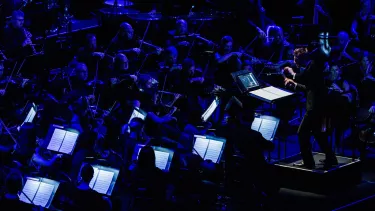
SOH: How indebted are artists like John Williams to classical and Romantic composers?
NB: Hugely. In many ways. That's why so many composers have been derided, but at the same time, that's sort of their genius.
The 1920s, 1930s, was really the Golden Age of Film Scoring. And that's because all the composers there were dudes straight out of the Viennese schools. Guys from Germany and Austria and France who basically wrote Operas and were peers of Stravinsky and these guys. They came to America and they were the ones writing all this music. Look at Gone with the Wind, Max Steiner. And Erich Wolfgang Korngold. All these great European composers who have written fantastic classical music that is performed in concerts by the classical orchestras just as is.
And from there, then you get people like Williams, Jerry Goldsmith, Bernard Herman who might have played piano for these guys when they were boys. And then all of a sudden, that European sound of Stravinsky and Tchaikovsky has permeated one generation through and then onto Williams.
SOH: It's funny how that's paralleled by the films themselves. A film like Star Wars being so deeply indebted to classic Japanese films from the 50s and earlier.
NB: Totally. Kurosawa's. And even Westerns. And mythology. It's history reinventing itself through literature and art over and over again. And even the great filmmakers today are probably reinterpreting Star Wars, which in itself has reinterpreted something else.
SOH: Do you think live scores are a fad? How much longevity does the idea have?
NB: Excellent question. And it's the question everyone is asking, and to be honest, it's a real fear. One of the reasons is, when you look at contemporary films, you wonder what's going to replace the great films from the 70s, 80s and 90s that we look at now. One of the problems is that contemporary film music is more and more going 'digital'. It's very minimalist. It might use a lot of synthesizers and samplers and basically 'fake' instruments in some ways.
Look at a film like The Social Network. It had a great score by Atticus Ross and Trent Reznor. An orchestra just simply couldn't perform that live. Even the music of Hans Zimmer, another great big genius of the film music world. A lot of his scores are multilayered with orchestras with 50 cellos being recorded three times and layered up to sound like hundreds of cellos. We're really limited by what's available that fits the symphony orchestra mould. And that's going to run out eventually. It really is.
We can't start pulling out every B-grade film - and that's starting to happen. Sure there are nostalgic films from our childhood or films that have cult followings, but that doesn’t always mean the scores are great.
SOH: How much room do you think there is for developing the concept? The Opera House for example has had various rescorings of classic films in recent years.
NB: To develop the concept you probably need to look at more obscure older things. When you think of Fritz Lang's Metropolis from the 1920s — it’s had like 200 or 300 rescores throughout time. Everyone's tried something with it, and that's interesting.
The next thing that might come forward are all the Marvel films. The big problem there is that, I just don't think the music is as memorable and it suffers a bit from this contemporary style of writing, where a lot of it is electronic synthesizers and less organic symphony orchestra stuff. More of a hybrid and that could be quite tricky to put together.
One thing we haven't talked about is video game shows. I worked on one last year for a game called Metal Gear. Again, it's more of a niche thing, because you're targeting people who are fans of the game and the music. Game music has come leaps and bounds since Mario Brothers. *Hums Mario theme* Now you're getting 80-piece full symphonic scores with choirs to rival any contemporary Hollywood blockbuster. And you reach people - the gaming community is huge.
SOH: I saw on Twitter that the creator of Metal Gear came to your Star Wars concerts in Japan.
NB: Hideo Kojima! I saw that as well. But I didn't meet him unfortunately. He came to all three!
SOH: What's it like returning to the Opera House?
NB: My very first professional gig and first film gig were both in the Opera House. It really has a special place in my heart, especially for these types of films. The Concert Hall is a great room. It's not too big. It's not a big arena with 6000 people where you can get a bit lost. Especially with these film shows, you want a certain amount of intimacy, a sense of comradery with the audience.
Many people say that seeing these film things is like seeing the film for the first time again, especially when you're there with people who are like-minded and are really enjoying the novelty of seeing it with a live orchestra. That alone is enough to create a real buzz, where you can 'geek out' together, so to speak, and enjoy the music together.
You can hear more film music analysis from Nicholas on his podcast Art of the Score.
You may also like
